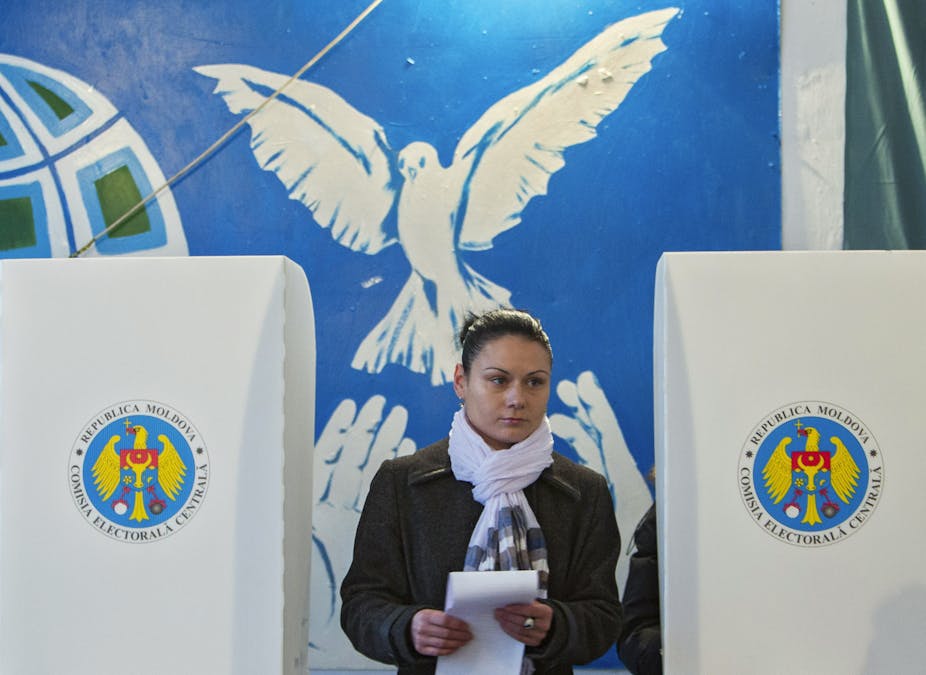Moldova has gone to the polls in a vote seen as crucial for determining the country’s future direction. Preliminary results indicate that the pro-European parties together achieved about 44% of the vote, while those parties considered to be more pro-Russia came in with just under 40% of the vote, on a turnout of around 56%. These headline figures, however, mask a more complicated picture.
The pro-European parties – the Liberal Democrats, Liberals, and Democrats – formed part of a coalition government until last year when the Liberals left the Alliance for European Integration and went into opposition.
The coalition of Liberal Democrats and Democrats survived because the Liberals themselves split, with the Reform wing of the party (including seven of its 12 deputies, including two ministers) joining the Liberal Democrats.
This was not the first crisis in the coalition. A month previously Vlad Filat, the leader of the Liberal Democrats, was forced to step down as prime minister after losing a no-confidence vote in parliament.
So while 44% of this latest vote may numerically translate into a majority in the 101-seat parliament, it is by no means a foregone conclusion that the original Alliance for European Integration can be revived.
On the other side, the so-called pro-Russian parties are not a homogeneous bloc either. The Socialist Party has secured the biggest share of the vote for a single party, at 21%, but it is unlikely to lead a future government.
The Moldovan Communist Party, which came in first in the three preceding parliamentary elections in 2009 and 2010 and had formed the government for two terms prior to that, came third this time, with just under 18% of the vote.
The Socialists are pro-Russian and anti-EU while the Communists are pro-Russian but not anti-EU. In fact, it was under the Communist government in 2003-4 that Moldova’s initial turn towards Europe occurred. The combined result of both parties indicates, however, that a significant number of Moldovans feel strong ties to Russia and that they are not willing to sacrifice those ties for future promises of closer relations with the EU.
All this will make forming a government difficult. One way to slice the cake is to look at it from the perspective of pro-EU versus pro-Russia parties. Another would be to form a grand coalition that is neither anti-EU nor anti-Russia. This could bring together Liberal Democrats, Democrats and Communists, who, together, would have a comfortable majority of more than 50% of the vote, and probably more than 60% of the seats in parliament.
If coalition negotiations along those lines succeeded, they would provide Moldova with a measure of domestic political stability, but at the price of slower integration into Europe.
Russian interests
But politics in Moldova is not only about domestic horse-trading. At a time of profound crisis in neighbouring Ukraine and an all-time low in relations between Russia and the EU (and the West more generally), the aftermath and outcome of these elections will be as much determined by geopolitics as anything else. The next steps taken by Moscow and Brussels in their stand-off will be crucial.
Unlike the situation in Ukraine, Russia already has a foothold in Moldova. The break-away region of Transnistria, an area on the east bank of the River Nistru, is politically and, to a slightly lesser extent economically, completely dependent on Moscow.
The presence of Russian troops in Transnistria adds to Moldova’s fear that Russia could use military muscle to interfere in Moldova’s political process, as it did in Ukraine.
Russia potentially has additional leverage through its influence in Gagauzia, a small autonomous region in southern Moldova that has traditionally, and increasingly, been more pro-Moscow than pro-Brussels.
If Russia wanted to destabilise Moldova, Gagauzia would be a good place to start. There have been signs in the past that this is not as unlikely a scenario now than it may have been a few years ago.
European pressure
Yet, Russia is, of course, only part of the equation. Moldova’s future will also depend on how the EU acts in light of the election results. This is uncertain since the vote has produced neither a conclusive endorsement of a pro-European course nor a resounding rejection of closer ties with Brussels.
The EU’s overall objective in Moldova should be long-term stability even if this can only be achieved by slowing down the process of reinforcing ties between the country and Europe.
Pushing hard for a speedy and full implementation of the Association Agreement and free trade would not be popular with many Moldovans. Given the fact that these deals could have short-term negative consequences for living standards, as investments will need to be made to meet European standards, such a tactic could alienate even pro-Europeans.
A slower pace of integration would be a better option for a number of reasons, not least because it would increase the chances of a grand coalition government forming. A more relenting pace would also allow such a government to tackle some of Moldova’s deep-seated structural problems, including its high levels of corruption, without jeopardising the bigger goal.
While this would leave a democratically legitimate government with a broad support base in the driving seat, it would also be less likely to force Russia’s hand, as has happened with difficult consequences in Ukraine.
Even in the best-possible scenario, Moldova has a long way to go before it sheds its reputation as one of the most corrupt and poorest countries in Europe. It will be up to the country’s political elites, as well as their respective external patrons, to decide whether these elections are the first step in this direction.

